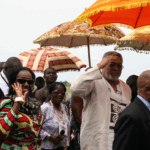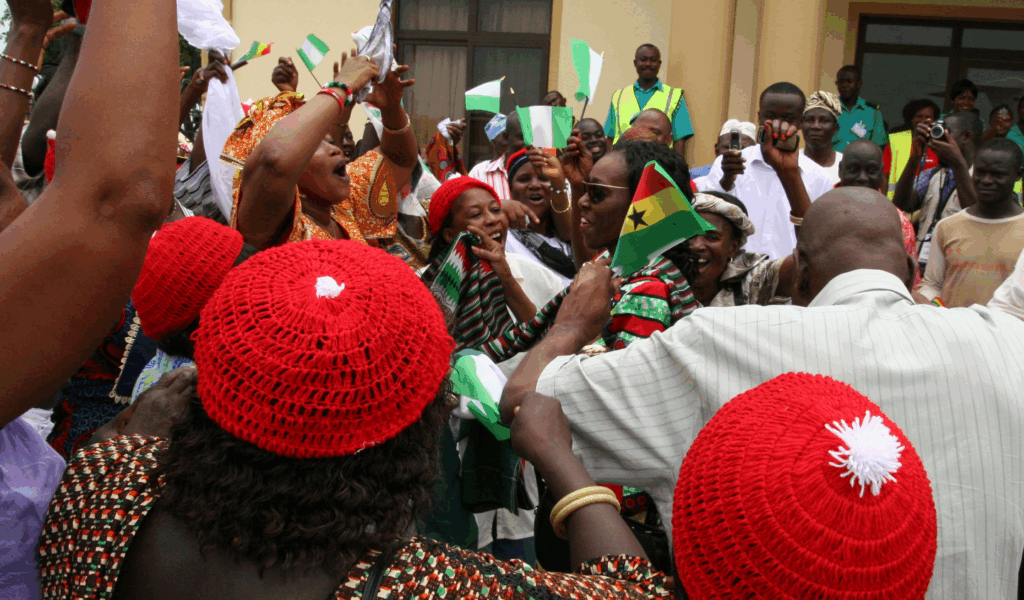
The silence in Accra is profound. The passing of Nana Konadu Agyeman-Rawlings is more than a news headline; it marks the closure of an extraordinary, often tempestuous, chapter in Ghana’s political soul.
The former First Lady, a towering figure often called the Iron Lady, died at 76 on October 23, 2025, leaving a palpable void felt not just in the capital but across the rural villages she touched. Her life was an uncompromising, decades-long crusade for the dignity of the Ghanaian woman.
Her death, coming nearly five years after that of her late husband, Jerry John Rawlings, feels like the final turn of a key in the nation’s post-independence narrative. Ghana weeps for a true pioneer.
The State Acknowledgement: Tributes for a Force of Nature
As news of her passing at the Greater Accra Regional Hospital spread, the national reaction was an immediate and deep-seated acknowledgment of a life lived without compromise.
Former President Nana Addo Dankwa Akufo-Addo released a statement conveying deep sympathies, describing her as “a woman of great conviction and passion for the empowerment of the Ghanaian woman.” He also ordered all national flags to fly at half-mast for seven days in her honour — an unprecedented tribute for a former First Lady.
Politicians, regardless of party lines, now confront the legacy of a woman who was impossible to ignore. A former political rival remarked, “You didn’t have to agree with Konadu, but you had to respect her fire. She redefined the power of a First Lady.”
Ordinary Ghanaians — market women, farmers, and rural teachers — feel the loss most keenly. They saw themselves in the tenacity of the woman who, even after leaving the presidential residence, continued to run.
Her daughter, Princess Amina Rawlings, once read a tribute to her father that captured this bond, noting how her mother “had to learn to understand how to be streetwise, move along with the flow… but it still did not sit well with me.” This tension defined her life: a well-bred woman who chose the dirt roads of revolution.
She served two distinct terms as First Lady — a brief one in 1979 and a longer, consequential tenure from 1981 to 2001 — during which she fundamentally redefined the role from that of a social hostess to a powerful, policy-influencing political actor.

Tribute from the Political Frontier: NPP’s ‘Disbelief’ Unifies National Sorrow
The depth of national mourning was further crystallised by the immediate, heartfelt reaction from the opposition New Patriotic Party (NPP). Speaking on a national platform, the NPP’s Deputy General Secretary, Haruna Mohammed, expressed the party’s “deep shock” and “disbelief,” stating, “We in the NPP are in a state of disbelief… Nothing showed that she was unwell or that she was going to leave us so soon.”
This candid reaction, beyond the requisite state condolences, underscored her unifying influence. It confirmed that her stature as “a towering national figure who contributed immensely to Ghana’s democratic and social development” transcended the fierce political rivalries that defined her later years.
The statement concluded: “But who are we to question the will of God? God has decided to call her back, and we, as humans, can only accept His will.”
Mahama Leads National Moment of Silence and State Notification
In a separate but equally significant act of state protocol later that day, President John Dramani Mahama led a solemn moment of silence at the Jubilee House immediately prior to the swearing-in ceremony of 37 newly appointed High Court judges.
This spontaneous halt to official proceedings underscored the depth of national mourning. The President confirmed that the state had been formally notified of her death, and in his address to the gathering of judicial and political officials, he requested a collective mark of honour for the woman who became Ghana’s first female presidential candidate in 2016.
The poignant moment of national tribute closed with the President’s words: “…as we rise and pay a moment of silence to her memory, may the Almighty God grant her peaceful rest in His bosom. Thank you. Amen.”
This final mark of respect from the Head of State ensures that Nana Konadu’s passing is acknowledged across the political spectrum as a national loss.
A Legacy Etched in Grassroots Power and Global Law
Nana Konadu Agyeman-Rawlings was no ceremonial figurehead. Her authority was authentic, drawn directly from the soil and the sweat of Ghana’s women. She did not just advocate — she mobilised.
Her masterpiece was the 31st December Women’s Movement (31st DWM), founded in 1982. It was a powerful, grassroots machine built on the revolutionary belief that women held the key to breaking the cycle of poverty.
Speaking on her core mission, she declared: “My desire is to see the emancipation of women at every level of development to enable them to contribute to and benefit from the socio-economic and political progress of the country.”
The movement’s achievements were concrete, not cosmetic. It is estimated to have mobilised over two million women. The establishment of more than 870 pre-schools across the country was a strategic intervention, freeing rural mothers to engage in economic activities.
Furthermore, the 31st DWM was a key implementer of national development policy — notably through partnerships with the Non-Formal Education Division to deliver literacy programmes — firmly embedding her organisation within the state’s apparatus for change.
Her impact was felt most dramatically in the law. She was instrumental in the enactment of the Intestate Succession Law (PNDCL 111) of 1985, a pivotal reform that secured the inheritance rights of widows and children.
Crucially, in 1991, through the tireless efforts of Nana Konadu and the DWM, Ghana became the first nation globally to ratify the United Nations Convention on the Rights of the Child (UNCRC).
Legislative Crusades Against Oppression and Political Influence
Beyond property rights, Nana Konadu’s advocacy was instrumental in pushing for legislation to curb abusive cultural practices. Her lobbying in the late 1990s contributed to the passage of laws that criminalised harmful socio-cultural practices such as Trokosi (ritual servitude/slavery) and female genital mutilation (FGM).
These victories were critical in her quest to dismantle the structures of institutionalised gender oppression. “Before December 31, 1981, they had no power of influence in law or politics,” she once stated, highlighting the monumental shift from traditional barriers to legal protection.
Her humanity drove her legal activism — the protection of a grieving mother’s home and a child’s future.
Her political influence was also a stabilising, though sometimes volatile, force within the Provisional National Defence Council (PNDC) regime and the subsequent transition to the Fourth Republic in 1992, making her an undeniable figure in Ghana’s return to multi-party democracy.
The Intransigence of ‘Femocracy’ and the Obaadenden Trope
After her record-setting two-decade tenure as First Lady, her fire did not dim — it merely changed direction. She remained an unyielding force, her political style even earning the analytical term “femocracy”.
This label captured the critique that she appropriated the language of women’s empowerment to advance political interests, often fuelled by controversies surrounding the 31st DWM’s commercial wing, Caridem, which acquired several divested state-owned enterprises.
However, scholars now argue this analysis is insufficient, overlooking the patriarchal structures that constrained her political power.
In local parlance, she was sometimes described by the trope of the Obaadenden — the “hard” or “difficult woman” — a label reserved for women who defy social expectations of deference. Such labels represented a form of gendered criticism, often used by political opponents and sections of the media to delegitimise her authority simply because it did not conform to the traditional, subservient image of a leader’s wife.
Her ultimate act of political self-definition was heartbreakingly personal: challenging the very party her husband co-founded, the National Democratic Congress (NDC), in 2011.
This schism — and her subsequent founding of the National Democratic Party (NDP) — was a bold statement of political independence. Her legacy was cemented when she became the first woman in Ghana’s history to appear on a presidential ballot in 2016. That candidacy shattered a political glass ceiling, proving a woman’s place in Ghanaian politics was not merely beside a man, but in the arena, alone if necessary.
An Intimate Goodbye
The recent glimpses of her public life now feel like tender final farewells. Her attendance at the funeral rites of the late Asantehemaa, Nana Konadu Yiadom III, where she joined the Asantehene, Otumfuo Osei Tutu II, offered a final image of the private matriarch — graceful, composed, and resolute.
Now she is gone. The student from Achimota, the Art and Textiles enthusiast, the uncompromising advocate for change. Her death marks the ultimate closure of the powerful Rawlings political era.
She did not just change laws — she changed lives. Her legacy is one of grit, conviction, and an unyielding belief in the political and economic potential of the Ghanaian woman.
Her passing is a profound loss for Ghana, for Africa, and for women everywhere who will forever draw strength from her courage.
She was, in the truest sense, a pioneer who carved her own path. Ghana remembers its mother of empowerment.